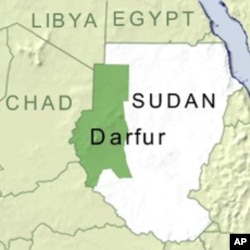Chadian President Idriss Deby met with his Sudanese counterpart Omar Hassan al-Bashir in Khartoum this week in what could be a breakthrough moment in the easing of relations between the two countries.
The two have announced that they will work towards peace within their troubled border areas. Chad has long-accused its eastern neighbor of granting safe harbor to opposition militias, and Sudan claims Chad supports certain Darfuri rebel groups.
Another round of Darfur peace talks are under way in Doha, although no breakthrough has yet been announced.
Most say that any potential peace arrangement in the region would require an end to the proxy war between Chad and Sudan. The talks are also plagued by deep distrust between the two sides and a rebel movement too fragmented to unite under a common position.
Whether or not the commitments from the two leaders will result in any immediate tangible change on the ground is not yet clear.
Analysts suggest that the sudden change of heart between the two leaders is due to the political realities facing each president in upcoming elections. Sudan's polls are set to take place in only two months, and Chad's vote is scheduled for 2011.
Darfuri Fouad Hikmat, an analyst for the International Crisis Group, says that President Bashir does not want to see the rebels disrupt the April vote, where he hopes to receive support from the nomadic Arab tribes.
"Darfur is the largest constituency after South Sudan. And therefore it is extremely important for [Bashir's] NCP that, if the elections are going to happen, it is going to happen in such a way that nobody is able to derail it by increased insecurity or attacks in Darfur," he said.
Many of those from communities supporting the rebel movements remain in internally displaced camps or are living as refugees in Chad. Rebel groups say such a situation prevents any chance of fair elections and have demanded the polls be postponed.
The strongest and most mobile of the many Darfuri rebel factions is the Justice and Equality Movement, known as JEM, which espouses a conservative Islamic ideology.
JEM's base of support arises largely from the Zaghawa people group, which straddles the Sudan and Chad border. President Deby is also Zaghawan, and once used Darfur to launch his own military campaign to seize power.
Khartoum is hoping that President Deby will be able to reign in his ethnic brethren within JEM. In exchange, Chadian rebels would no longer be allowed to use Darfur as a base for armed operations.
But Hikmat doubts whether the Chadian president has either the political leeway or sufficient control over JEM to fulfill his pledge.
"It will be very difficult for Deby to deliver to Bashir, and less difficult for Bashir to deliver to Deby," Hikmat added.
The April elections in Sudan will be the nation's first multiparty elections in 24 years.




